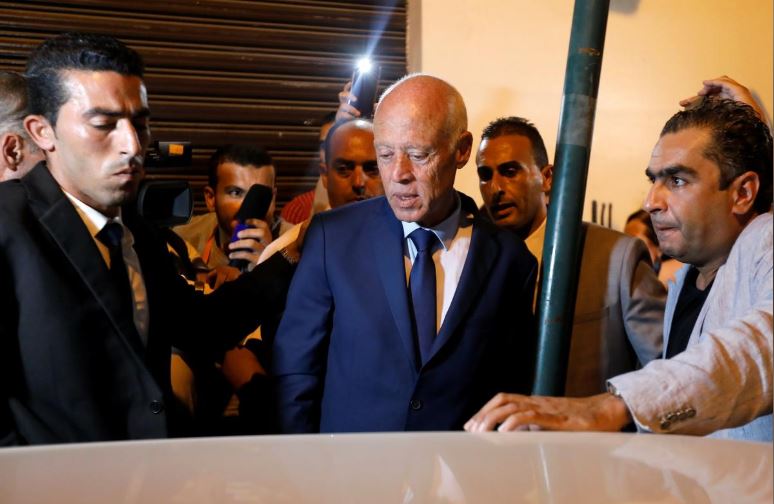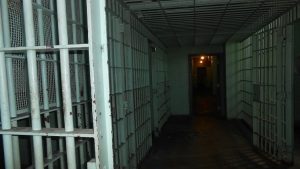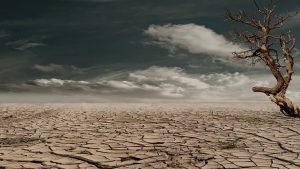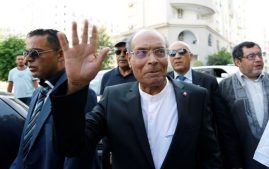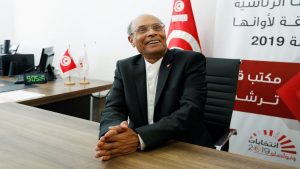Two political outsiders said they believed they had advanced to the second round of Tunisia’s presidential election on Sunday, citing exit polls, though no official results have been announced.
A representative for detained media magnate Nabil Karoui said he had scored “an impressive win”, while conservative law professor Kais Saied, who was largely unknown before the election, said his performance marked “a new revolution”.
If confirmed, their success on Sunday in a vote marked by low turnout would be a sharp rebuke to Tunisia’s established political powers after years of economic frustration. Only 45% of registered voters took part, compared to 63% in 2014, official figures showed.
However, the moderate Islamist Ennahda party, a partner in recent coalition governments, said its count, to be announced at a news conference later, was different to that released in exit polls.
A party official, speaking anonymously, said the race was between Karoui, Saied and the Ennahda candidate Abdelfatah Mourou.
Tunisia’s prime minister, two former prime ministers, a former president and the defence minister were also among the 26 candidates on the ballot.
“This is an impressive win that shows Tunisians want to cut the old system and want to see a leader who is like them… it is a lesson for the rulers,” said Samira Chaouachi, an official in Karoui’s party.
A court on Friday ruled that he must stay in detention after his arrest last month on three-year-old charges brought by a transparency watchdog for tax evasion and money laundering.
He denies wrongdoing and his supporters say the timing of his arrest showed the establishment was trying to silence him. His critics accuse him of illicitly using his unlicensed television station and his charity as campaign tools.
Saied, a conservative constitutional law professor, is also a political newcomer. In the televised debates shown over consecutive nights last week, he expressed support for the death penalty and opposition to equal inheritance rights between men and women.
With no real political machine or publicity campaign, Saied has appealed to Tunisians in television appearances speaking in a highly correct form of Arabic devoid of the colloquial expressions used by most of his compatriots.
The simplicity of his campaign may also have strengthened his credentials as a crusader against the corruption which many Tunisians believe has bedeviled their transition to democracy.
ARAB SPRING
Heavily indebted, Tunisia’s next government, like its last, will have to navigate popular demands to relax public purse strings while foreign lenders push for spending cuts.
Tunisia threw off autocratic rule eight years ago in a revolution that inspired “Arab Spring” revolts in Egypt, Yemen, Bahrain, Libya and Syria, but it alone has enjoyed a peaceful transition to democracy.
However, after years of economic troubles including high unemployment and inflation, many Tunisians have voiced frustration over their government’s inability to improve living standards.
Many voters are disillusioned. In the poor Ettadamen district, Mouaz Chneifiya, a 42-year-old unemployed man, was sitting in a cafe and said he would not vote.
“Since the election we’ve been getting promises and nothing is done on the ground, so why vote? The elections will end and the promises will be dropped as soon as they get into office like in past elections,” he said.
In the central Lafayette district of Tunis, dozens of people stood patiently queuing in the Rue de l’Inde primary school in a whitewashed stucco courtyard under sky blue wooden shutters.
Kholoud Alwi, 27, said none of the candidates had convinced her. “But I have to vote. It’s important for the country,” she said.
CROWDED FIELD
The election was brought forward after the death in July of the incumbent Beji Caid Essebsi.
Tunisia’s president has direct control over foreign and defence policy while most other portfolios are handled by a prime minister chosen by parliament, for which an election will be held on October 6.
With that limited role, many candidates have emphasized their policies on security – an area in which Tunisia has improved since two jihadist attacks in 2015 killed scores of tourists, devastating the country’s tourism sector.
A pair of armed soldiers stood outside each polling station Reuters visited.
Despite economic frustrations, many voters said they were proud of Tunisia’s march to democracy.
Outside the capital, in the village of Sidi Thabet, six middle-aged men sat debating the merits of rival campaigns in a field under the shade of a gum tree, having pulled chairs over from the cafe opposite.
They each had the inky forefinger that showed they had voted, and were united in concern at the poor level of public services in a local economy based on growing olives, vegetables and fruit, though they supported different candidates.


